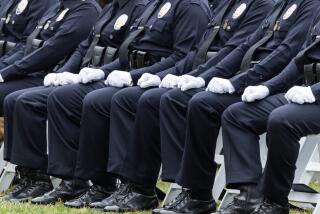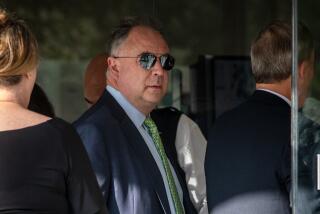FBI Agent Is Ordered Jailed, Freed by Judge : Courts: Action is designed to speed appeal of contempt order issued for his refusal to testify in civil suit over LAPD shooting.
A federal judge Thursday ordered an FBI agent who refused to testify in a civil case involving a police shooting to be jailed, but then allowed the agent to remain free pending an appeal.
The order was a technical maneuver needed to speed federal prosecutors’ appeal of a contempt order U.S. District Judge J. Spencer Letts issued against FBI Agent Richard Boeh last week.
Boeh has been investigating a Los Angeles police shooting that occurred after a holdup in Sunland in 1990. He refused to obey Letts’ order to testify about the investigation in the trial of a lawsuit filed against the police by the families of three robbery suspects who were killed by officers and a fourth robber who was shot but survived.
In following the instructions of U.S. Justice Department attorneys, Boeh also refused to discuss the case in chambers with the judge.
After Letts held the agent in contempt, government attorneys filed an emergency appeal. But the U.S. 9th Circuit Court of Appeals rejected it Wednesday, ruling that there was no emergency because Letts had taken no punitive action against the agent.
Letts apparently sought to rectify that Thursday in a closed hearing by ordering Boeh jailed. But he also agreed to Assistant U.S. Atty. Sean Berry’s request that the agent be freed on his own recognizance--without bail and with a promise that he would appear for court hearings.
After the 30-minute hearing, Boeh left the judge’s chambers and went back to work while the U.S. attorney’s office filed a new emergency appeal.
The jury trial of the lawsuit has been in recess since the contempt order was issued, prompting the need for a quick review by the appeals court.
Boeh was not fingerprinted, photographed or booked into a jail cell, U.S. Marshal Craig L. Meacham said. In fact, he was out of the courthouse before the marshal’s office was informed of the judge’s ruling, Meacham said.
The marshal said allowing the agent to avoid the booking process is routine for individuals freed on their own recognizance after an appearance in court. He said he consulted Letts’ office and Berry and will only “process” the agent if Letts orders it.
Stephen Yagman, the attorney for the plaintiffs, said Meacham’s decision not to book the FBI agent showed favoritism. He said the decision could also cause the appeals court to again reject the case because no real sanction was taken against Boeh.
“There is no question that Mr. Boeh’s status as an FBI agent has caused the marshal’s office to violate its own procedures,” Yagman said. “It is Mr. Meacham taking care of his cousin the FBI agent. It’s an outrage. It is not routine for someone not to be booked.”
The U.S. attorney’s office declined comment.
The jailing order of Boeh was unusual and significant, said Yagman, who subpoenaed Boeh to testify.
Yagman wants Boeh to testify in the trial because he believes the agent has information supporting the $10-million lawsuit’s contention that the four robbers were unarmed and that members of the police Special Investigations Section opened fire without reason. The police have said they fired when the robbers pointed weapons at them.
“The citizenry of this country ought to be shocked by this,” Yagman said of Letts’ order. “The federal government is trying its best to protect brutal and corrupt police.”
More to Read
Sign up for Essential California
The most important California stories and recommendations in your inbox every morning.
You may occasionally receive promotional content from the Los Angeles Times.










